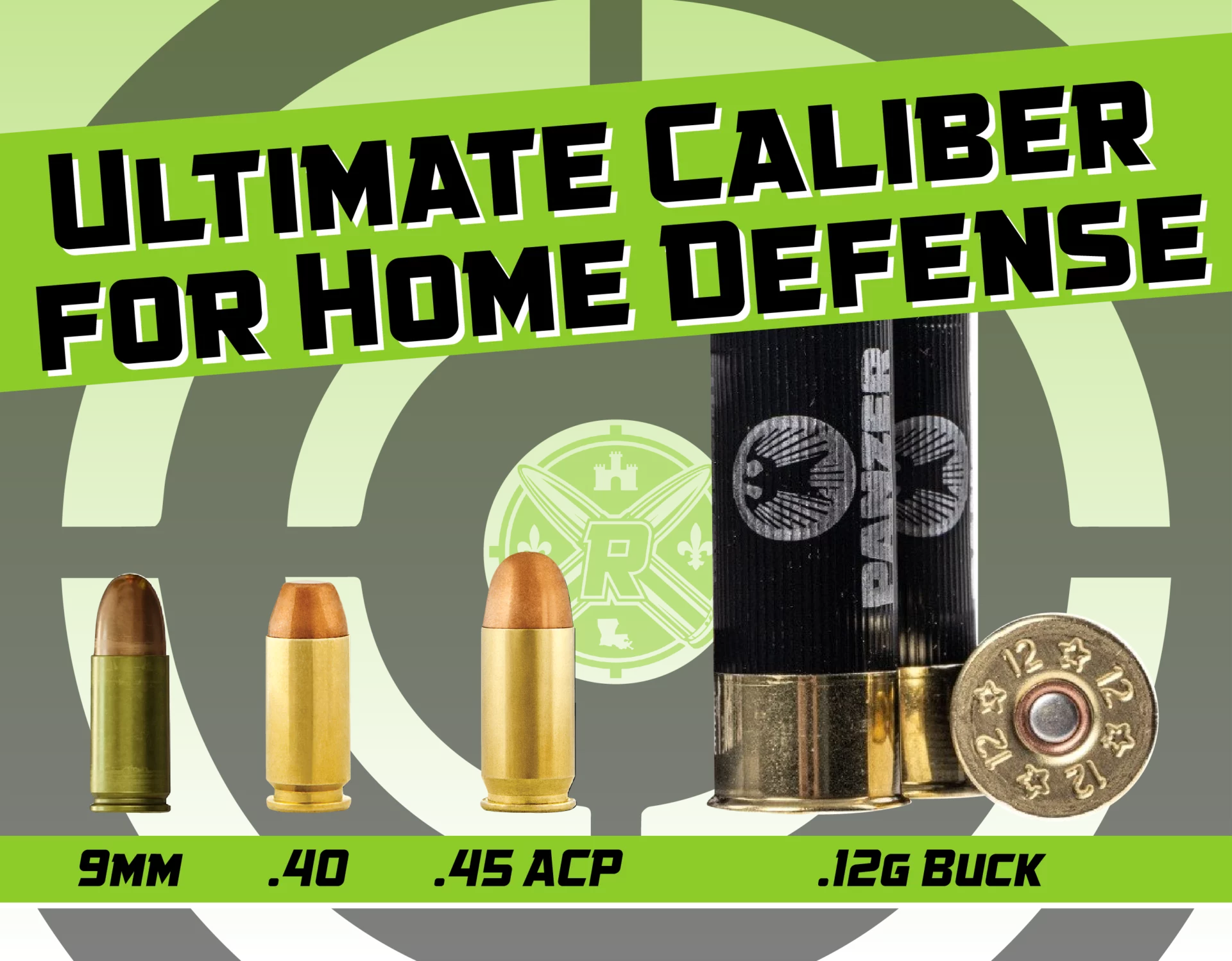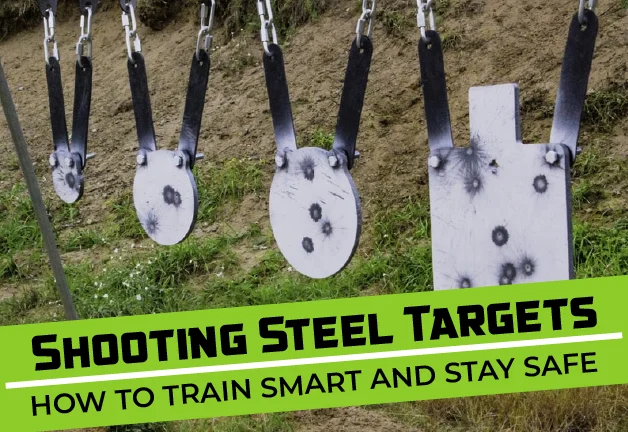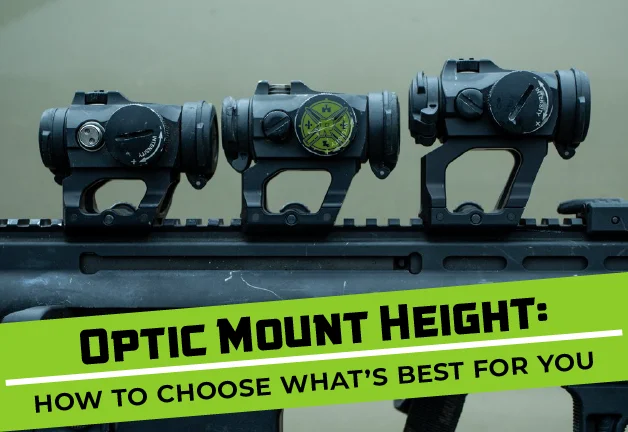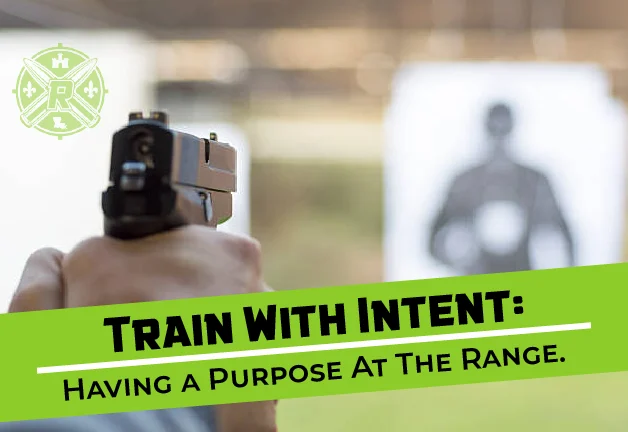When it comes to home defense, choosing the ultimate caliber is a crucial decision that can impact your safety and effectiveness in a potentially dangerous situation. Whether you’re a seasoned gun owner or just starting to think about home protection, understanding the various calibers and their characteristics can help you make an informed choice. In this blog, we’ll dive into the most popular calibers for home defense and discuss their pros and cons, so you can decide which one best suits your needs.
Choosing your Ultimate Caliber for Home Defense
Before we dive into specific calibers, it’s important to consider some of the key factors that play a role in choosing the ultimate caliber for home defense:
- Stopping Power: The caliber should have enough stopping power to neutralize a threat effectively without over-penetrating and posing a danger to others in the home.
- Accuracy: In a high-stress, potentially close-quarters encounter, you need a caliber that allows for quick and accurate shots.
- Recoil Management: A home defense gun should be manageable under stress, so a caliber with manageable recoil is essential for quick follow-up shots.
- Ammunition Availability: Ideally, your home defense caliber should be one that is easy to find in stores, especially in times of high demand.
- Noise and Penetration: Consider how the caliber’s noise level will affect you and those around you in a confined space. Additionally, the potential for over-penetration (the bullet passing through walls and into other rooms) is something that should not be overlooked.
With these factors in mind, let’s explore the top calibers commonly used for home defense.
9mm: The Popular Affordable Choice
Why 9mm is a Top Contender:
The 9mm caliber has earned its reputation as one of the best all-around calibers for home defense. It strikes an excellent balance between stopping power, recoil, and magazine capacity but is it the ultimate caliber for home defense?
Pros:
- Balanced Stopping Power: The 9mm is known for its effective stopping power, particularly when using modern hollow-point ammunition. It provides enough energy to incapacitate a threat quickly, but it’s not likely to over-penetrate excessively, making it safer for use inside the home.
- Manageable Recoil: Compared to larger calibers like .40 S&W or .45 ACP, the 9mm has relatively low recoil, making it easier to handle, especially for those who may not be as experienced with firearms. This makes it a good option for quick follow-up shots.
- High Magazine Capacity: Many handguns and rifles chambered in 9mm offer high magazine capacities from 12-20rounds, allowing for multiple shots if needed. This can be crucial if the situation involves more than one intruder.
- Availability: 9mm ammunition is widely available, making it easy to stock up and find replacement rounds when needed.
Cons:
- Limited Stopping Power Compared to Larger Calibers: While the 9mm is very effective, some people feel it lacks the sheer stopping power of a larger caliber like .40 S&W or .45 ACP. However, with modern hollow-point designs, the 9mm is more than capable of neutralizing a threat.
- Best For: Shooters who want a reliable, cost-effective, and easy-to-manage caliber with sufficient stopping power for home defense.
12 Gauge Shotgun: The Ultimate Close-Range Power
Why is a Shotgun a Top Choice:
The 12-gauge shotgun is arguably the most powerful home defense firearm you can own. Shotguns like the Remington 870 or Mossberg 500 have been trusted for generations by law enforcement and homeowners alike. They deliver devastating force at close range, making them a top choice but is it the ultimate caliber for home defense?
Pros:
- Devastating Stopping Power: The shotgun is capable of delivering multiple projectiles (shot) or a single slug, causing significant damage to a target. This can quickly incapacitate an intruder and give you a major advantage in a self-defense situation.
- Wide Spread of Shot: One of the key benefits of a shotgun is the spread of the pellets. At close range, this increases your chances of hitting the target, even if you’re nervous or under stress. This can be an advantage if you’re not as accurate under pressure.
- Intimidating Sound: The sound of a pump-action shotgun being chambered can be a deterrent in itself. The mere sound of a shotgun being readied may convince an intruder to flee before you even need to fire.
Cons:
- Over-Penetration Risk: While buckshot is less likely to over-penetrate than a rifle round, it can still pose a risk to other people or rooms in the house if not used carefully.
- Cumbersome: A shotgun can be unwieldy in tight spaces and may be difficult to maneuver inside a home, particularly in hallways or rooms with furniture.
- Recoil: Shotguns have significant recoil, which may be a factor for some shooters, particularly those who are not accustomed to handling powerful firearms.
Best For: Shooters who prioritize devastating stopping power, especially in close quarters, and are comfortable managing recoil and potential over-penetration risks.
.45 ACP: The Heavy Hitter
Why .45 ACP is a Great Option:
The .45 ACP (Automatic Colt Pistol) is known for its excellent stopping power, making it a favorite for those who believe in “big, heavy bullets” to take down a threat. It’s a popular choice for both handgun and carbine-style home defense firearms but is it the ultimate caliber?
Pros:
- Excellent Stopping Power: The .45 ACP delivers substantial force with each shot. It’s known for its ability to put a threat down with one well-placed shot.
- Effective at Close Range: The .45 ACP is very effective in close-range situations, where home defense encounters typically happen.
- Relatively Low Recoil: Compared to other high-caliber rounds, the .45 ACP has relatively manageable recoil in modern handguns, which helps for faster follow-up shots.
Cons:
- Lower Magazine Capacity: Due to the size of the round, .45 ACP handguns typically have smaller magazines compared to 9mm guns. This means fewer rounds before needing to reload.
- Over-Penetration Risk: Similar to the 9mm, but even more pronounced with larger rounds, there is a risk of the bullet passing through walls and posing a risk to others in your home.
Best For: Shooters who want more stopping power than 9mm without going to a rifle-caliber weapon, and who are okay with a lower magazine capacity.
.40 S&W: The Middle Ground
Why .40 S&W Works for Home Defense:
The .40 S&W is a middle-ground caliber between 9mm and .45 ACP, offering a balance of stopping power and manageable recoil.
Pros:
- Good Stopping Power: The .40 S&W provides a bit more power than the 9mm without the excessive recoil of the .45 ACP. It’s designed to deliver good performance in both self-defense and law enforcement scenarios.
- Available in Many Handguns: Many modern handguns are chambered in .40 S&W, offering you a wide variety of options to choose from.
Cons:
- Recoil: While more manageable than .45 ACP, the .40 S&W still has more recoil than the 9mm, which can impact accuracy, especially for new shooters.
- Magazine Capacity: The .40 S&W doesn’t offer the high magazine capacity of the 9mm, which can be a disadvantage in high-stress situations.
Best For: Shooters looking for a solid middle ground between the 9mm and .45 ACP, offering good stopping power with moderate recoil.
What’s The Verdict: Choosing the Best Caliber for Your Home Defense?
Ultimately, the best caliber for home defense depends on your personal preferences, experience, and the specifics of your home environment.
- 9mm is ideal for most people, thanks to its balance of stopping power, recoil control, and magazine capacity.
- 12-gauge shotguns are perfect if you want maximum stopping power and don’t mind the recoil and potential over-penetration risks.
- .45 ACP and .40 S&W offer excellent stopping power for those who prefer heavier calibers, but they come with trade-offs in recoil and magazine capacity.
Whatever caliber you choose, the most important factors are practice, training, and familiarity with your firearm. Ensuring that you’re comfortable handling your weapon and can use it effectively in an emergency situation is paramount. Make sure you invest time in learning how to safely operate your chosen firearm and regularly practice so you can confidently defend yourself and your loved ones in any situation.




